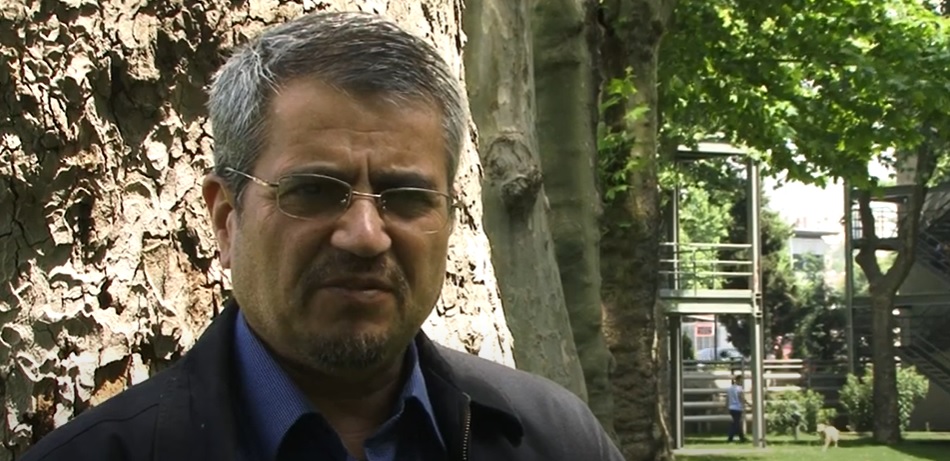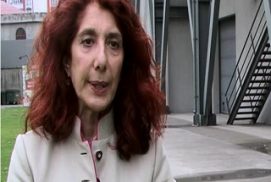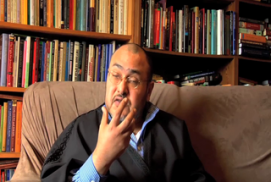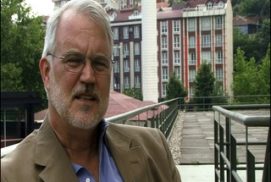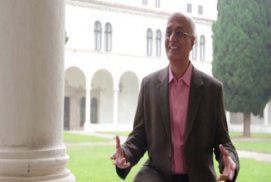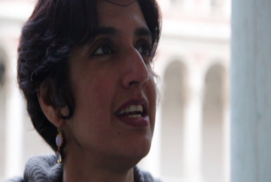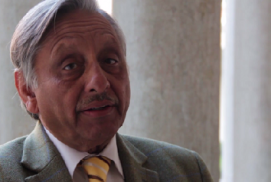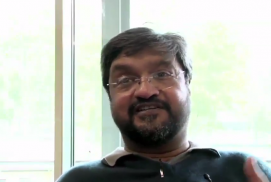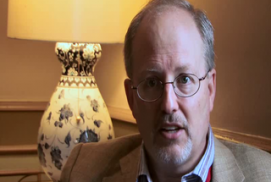
Videos

- Gholamali Khoshroo 26 March 2014“We must underline the importance of dialogue between Islam and the West, and we should overcome the historical difficulties that have divided them. The main condition for dialogue between the West and the Muslim world is: Western countries need to change their attitude and Muslims commit themselves to democratic norms, beyond the cliché that secularism means democracy and Islamism means dictatorship”, explains Gholamali Khoshroo, an Iranian scholar, Senior Editor of the Encyclopedia of Contemporary Islam and former Deputy Minister of Mohammad Khatami.
- 3 March 2014“Islam is in a transformative course of the European public space: this means that we have to engage in new ways of post-enlightenment understanding of Western modernity. More and more, the issues related to Islam are transforming the definitions of the European public spheres. Today we can’t frame the Islamic difference within the usual discourses of multiculturalism or neutral secularity. Religion and secularism might not be opposite binaries after all”, explains Turkish Sociologist Nilüfer Göle, whom we interviewed during our Istanbul Seminars 2013.
- 22 January 2014Do Muslims need to secularize the Qur’an to obtain rights, in particular women’s rights? “No, says philosopher Asma Barlas – a Professor of Politics and Director of the Center for the Study of Culture, Race, and Ethnicity at Ithaca College, USA – because the Qur’an is sacred and untouchable. But freedom in applying Qur’anic hermeneutics to support the struggle of women for equality and justice is important. Scriptures can be read and interpreted paying more attention to the problem of gender equality and following what I call an “antipatriarchal episteme”, because God’s word is in no way gendered.” We interviewed Prof. Asma Barlas during our Istanbul Seminars.
- 29 November 2013Islamic Law and the Rights of Others – Part 1 “The more human beings are able to explore and establish principles of justice, uphold of human dignity and resistance to oppression – so to freedom and liberty – the more they come to the divine objectives. This puts human rights and democracy at the very core of what it is to be a proponent of Shari’a”, explains Khaled Abou El Fadl, one of the world’s leading authorities on Islamic law and Islam, and a prominent scholar in the field of human rights, as well as the Omar and Azmaeralda Alfi Professor of Law at UCLA School of Law, USA. Watch Part 2 of this interview
- Craig Calhoun 19 November 2013“One really important thing is how we imagine the world, how we create some of the reality that we live in by imagining it. The phenomenon of the social imaginary gives us not just some topics that we talk about, but the very way we talk, the way we think of the world. How do people from one part of the world conceptualize other parts of the world? Do we think of humanity as a whole lot of individual people, or do we think about the kind of connections that we make? In our countries or even in our families and our cities, the social imaginary is a force that shapes even before we have made conscious decisions about how to act.” How? During our Istanbul Seminars, we interviewed professor Craig Calhoun, the current director of the London School of Economics.
- 4 November 2013“I think that scholars, both in India and in Europe, need to map the trajectory from irreverence to offence. There is a culture of irreverence, and this culture emerges from skepticism, from play, from a little bit of mischief..and gradually, as it develops, we find groups responding to that culture. Some accept it, some enjoy it, some are offended by it. Therefore, I think it is important – as a first exercise for both societies, the Indian and the European, which are in transformation, learning to live with diversity and pluralism – to map these different forms: irreverence, iconoclasm and then offence. Once you map that, you understand what are the elements of irreverence and iconoclasm which produce the offence. The production of this offence has two sides: it can emerge from the contents of what is said, from a film, a cartoon or a painting…and in can emerge from the perception of a group, so it is both content and perception. Very often the perception is produced by political groups, and here politics enters the production of perception. The production of that perception often produces an experience or an expression of offence, although the offence may not be intended and although it may be a very creative act,” explains professor Peter Ronald deSouza, now serving as the interim Director of the International Centre for Human Development in Delhi, India. We have interviewed professor de Souza during our Venice-Delhi Seminars 2012 held at the Giorgio Cini Foundation in Venice and the topic of this interview has inspired the subject of our 2013 Seminar held in New Delhi: “Religious Pluralism: Freedom and Diversity, Blasphemy and Respect.” More about the Venice-Delhi Seminars 2013 Read the proceedings of our 2012 Seminar Interview: Nicola MissagliaFilmmaker: Ruben Lagattolla
- Ananya Vajpeyi 23 September 2013“Swaraj literally means ‘selfrule’: it joins together the idea of the self and the idea of sovereignty, rule, or mastery. Swaraj was used most in the late nineteenth century and throughout the first half of the twentieth century to indicate the major political project that Indians were engaged in, through a number of anticolonial, nationalist movements and other kinds of political responses to the fact of British rule and British empire. Most histories of Indian nationalism or of India during that period tell the story of how India became politically independent and how it succeeded in ending British rule. But I couldn’t find any good narrative about the search for the ‘Self’, which is the “Swa” in the first half of Swaraj.” That is why Ananya Vajpeyi, Kluge Fellow at the The John W. Kluge Center of The Library of Congress in Washington D.C., has selected five key figures of India’s modern thought, politics and culture – Mahatma Gandhi, Rabindranath Tagore, Jawaharlal Nehru, B.R. Ambedkar and Abanindranath Tagore – to understand how they tried to find values and norms that could be set up as the scaffolding for a future India. We interviewed her during the Venice-Delhi Seminars 2012, held at the Giorgio Cini Foundation in Venice. Ananya Vajpeyi is the author of Righteous Republic. The Political Foundations of Modern India, Harvard University Press, 2012 Interview by Nicola Missaglia Videomaker: Ruben Lagattolla More about Venice-Delhi Seminars here Discover the September 2013 Issue of Seminar magazine, with contributions from the Venice-Delhi Seminars 2012
- 5 September 2013“I think the central issue before India at 66 years from its declaration of independence is that, whereas at the start we assumed that both democracy and development are desirable and can be secured together, increasingly we are facing a dilemma of democracy and development. An the reason for that is, that as our economy grows faster and faster – as it has been doing particularly in the last decade – we discover that higher growth leads to wider inequalities…and that a lot of the development process involves disruption. This is illustrated by the fact that about 65 million tribal Indians have been displaced as a result of development based on attempting to discover minerals and loose timber. In these circumstances democracy – which has become a grounded reality in India – has to find an answer in reconciling the growth of GDP with its impact on the people,” explains Mani Shankar Aiyar, an Indian MP and former diplomat and minister, interviewed at our Venice-Delhi Seminars 2012 at the Giorgio Cini Foundation in Venice, Italy. Mani Shankar Aiyar is a former diplomat, Member of Parliament (Rajya Sabha), India; Chairman, Expert Committee, Panchayat Raj Institutions, Delhi Interview by Nicola Missaglia Videomaker: Ruben Lagattolla More about Venice-Delhi Seminars here Discover the September 2013 Issue of Seminar magazine, with contributions from the Venice-Delhi Seminars 2012
- 24 July 2013“What has happened with the advent of people from former colonies and because of intensified globalization, is that for the first time in the history of modern Western Europe you begin to see a religious diversity that Europe has not witnessed before. The social and institutional arrangements in Europe are not adequate to deal with this diversity: they were adequate only do deal with the problems of a single religion, of accommodating that religion, or to fight against the excesses of that religion. Now you suddenly have multiple religions and Europe is really at a loss what to do with these religions. The European Union has a much better resource – because it has a much more universal perspective – but each society is still bound by its own arrangements and so they are feeling the strain”. This often leads to a defensive attitude towards diversity. But how can this wall of defense be broken? We asked Rajeev Bhargava, former Director of the Centre for the Study of Developing Societies in New Delhi, India.
- 10 July 2013Throughout history, European “corporations” helped develop strong civil societies and democracies while the so-called “waqf”, or Islamic trusts, delayed the rise of autonomous non-governmental associations capable of providing the checks and balances essential to democratic rule and thus, favored the emergence of autocracies. The Islamic tax – the ‘zakat’ – and inheritance laws fragmentized the commercial sector which failed to produce lasting constraints on rulers and bargaining effectively with the State. Does this mean that there are normative aspects of Islam which have hindered democratization and economic growth? At our Istanbul Seminars 2012, we have asked Timur Kuran, Professor of Economics and Political Science, and Gorter Family Professor in Islamic Studies at Duke University. – Filmmaker: Anna FanueleInterview and text editing: Nina zu Fürstenberg


